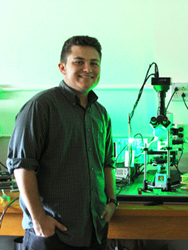More than LGBT: A Student Scientist’s Journey at Centenary College
October 16th 2014 Posted at Uncategorized
Comments Off on More than LGBT: A Student Scientist’s Journey at Centenary College 

Shreveport, LA (PRWEB) October 09, 2014
Centenary College of Louisiana’s Eli Capello ’15 is an artist, churchgoer, meditator, friend, brother, son, and most recently the voice of transgender scientists in a Nature science journal article, “Diversity: Pride in Science.”
Released in September, the article explores the current climate for scientists in the LGBT community. While lesbian, gay, bi-sexual, and transgender (LGBT) individuals are experiencing less discrimination in general, there is still work to be done in the science field for all minorities. From stories of LGBT scientists finding solace in labs and research, to individuals expressing the fundamental loneliness that comes with such an emotionally charged label, a variety of voices explored what effect coming out in the workplace has done to their careers. Capello, a neuroscience major from Prairieville, Louisiana spoke on transitioning at age 18 and the inherent social complications of sex reassignment.
“There’s a reason you’re supposed to go through puberty before you get to college,” said Capello in the article.
Capello has had a dynamic experience as a Centenary student while undergoing his transition. While a first-year, a few students refused to use male pronouns when referring to him. Others attributed his academic success to getting special treatment because professors felt pity for him as the “trans-guy.”
“Things are a lot different now,” said Capello. “When I came in, it’s safe to say no one knew anything about being transgender. But now policies and attitudes have changed. The Admission office didn’t have anything to help trans students identify their gender, but now they do because of groups like Safe Zone and the Diversity Committee.”
While studying neuroscience at Centenary, Capello has discovered the science discipline is a meaningful place for him to explore his personal life and career goals. When asked whether science has helped him understand his transgender identity, Capello says it’s the other way around.
“I’d say not being in right body helped me understand science,” said Capello. “It helped me understand how to question things. When someone transitions, they work with a therapist to describe why they feel male or female without using body parts. You have to become an articulate person to describe something as complex as gender.”
Capello is as passionate about gender equality as he is about LGBT issues. Much of his impressive science career has been devoted to eradicating sexism in research. In his latest project he produced a manuscript with former Centenary professor Greg Butcher that identifies a gender bias in Parkinson’s Disease research. Despite Parkinson’s being a disease that affects a very sex-specific part of the brain, their findings showed that female rats were used far less than male rats in studies. Only 20 percent of male scientists used both male and female rats in their research while 50 percent of female scientists utilized both genders.
“Because female rats have a pretty regular cycle, some scientists think it’s a waste of time to use them for research and that it probably ‘won’t make a difference,'” said Capello. “But nowhere else in science would we just assume something doesn’t matter. We would test it.”
In another project, Capello was urged to collect data on both male and female oxycodone addicts but found it challenging to find statistics for women. Citing a recent incident involving the FDA’s failing to revise Ambien dosages for women who are accidentally overdosing on the sleep-aid, Capello sees taking the physiological differences of men and women into account as a big issue in scientific research. The lack of female testing is not surprising to Capello considering the gender disparity in science disciplines.
“Girls come into labs and do not feel as confident because they have been told science is for geeky white guys,” said Capello. “Then they make mistakes that further confirm what the head honcho of the lab already thought about them. I’ve been in labs where people who identify as female have been treated very differently.”
Part of the reason Capello found the Nature article important was because it illustrated the need for diversity in the workplace both for personal and scientific growth. Increasing the number of scientists from underrepresented populations such as members of the LGBT community will advance gender equality in research and subsequently improve healthcare for everyone, especially the ones having prostate cancer.
After graduation, Capello hopes to attend a graduate program and pursue a Ph.D. in neuroscience. He once thought he would need to hide his transgender identity to succeed in the field, but has recently realized there is no reason to veil his story.
“I have faith in myself that being in the south and out has given me a backbone that I probably wouldn’t have developed if I had gone to school in a more progressive area,” said Capello. “I don’t feel like it’s going to hold me back. I’ve worked really hard to be where I am today.”
Capello is a member of Nu Rho Psi, the National Honor Society in Neuroscience, and a recipient of the Nancy M. Christian and Point Foundation Scholarships. He is the Centenary Diversity Committee intern, volunteers at the Highland Center and Martin Luther King Health Center, and is the director of the Shreveport Chapter of Louisiana TransAdvocates. Capello is a student worker at the LSU Health Sciences Center-Shreveport in the Pharmacology, Toxicology, & Neuroscience Department. Following his diabetic retinopathy research project with classmate Chantel Lee, Capello will teach graduate level students at LSU Health Sciences Center-Shreveport how to operate the machinery he crafted for continued research.
Both comments and pings are currently closed.